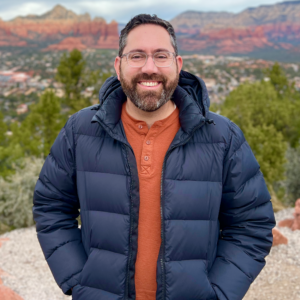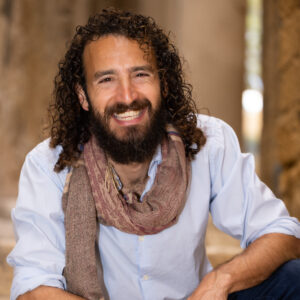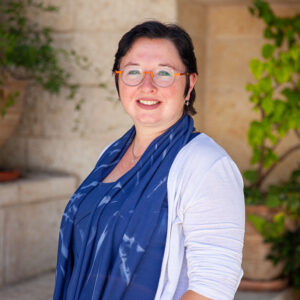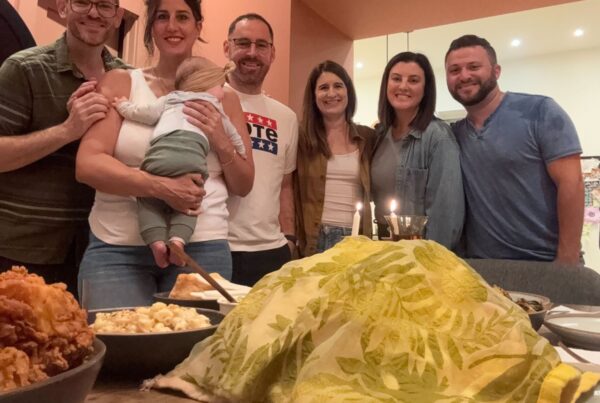April 2024
If Judaism is about memory, as Jewish teacher Avraham Infeld says, then the Passover story is one of the most foundational collective memories we have as a people. This story is one that has been told and re-told for thousands of years. It doesn’t change year to year, or generation to generation. But what does change is the world around us. What does change is our own lives, and who we are each time we hear the story.
This year, in this very specific moment in history, we asked some of our most beloved rabbis, educators, and tour guides to share reflections on how they’re relating to the Passover story at this time in the world. We invite you to read through these reflections and engage with them by discussing your own thoughts and experiences, and answering the accompanying questions with your partner, your family, or your HMI friends.
40 Years in the Desert: How do we find our way in dark times?
By HMI LA Educator Neil Spears
 I was in Israel in September 2023 with a Honeymoon Israel group from Los Angeles. As the news filled my feeds on October 7, I couldn’t help but feel a sense of personal connection to the unfolding horror.
I was in Israel in September 2023 with a Honeymoon Israel group from Los Angeles. As the news filled my feeds on October 7, I couldn’t help but feel a sense of personal connection to the unfolding horror.
I was just on the beach in Tel Aviv where people now ran for cover instead of wading in the beautiful water. I was just talking with our Israeli tour guide who had overnight gone from tour guide to volunteer relief coordinator extraordinaire. The joyful, connected memories from just a few weeks prior now felt suddenly clouded by violence and fear.
How do we go on from here? And how do we go on given the prolonged suffering of the hostages, the innocents in Gaza, and the alarming spike in antisemitism here in the US?
One answer came on that October morning in the middle of Shabbat services at my synagogue when a friend rushed forward to the rabbi with her open prayer book in hand. She gestured and whispered emphatically, clearly finding something in the liturgy that spoke to her. A few minutes later, the rabbi announced what it was: My friend had found a prayer for hostages printed right there in the prayer book.
Whether we were raised Jewish, chose Judaism, or love someone who is Jewish, the presence of this prayer invites us to find comfort in the fact that someone, perhaps decades or generations before us, has been in our shoes. And yet the fact that we are still here reading these words of lament is a living and breathing testament to the possibility that things will get better.
At this year’s Passover Seder, I do not need to put a single drop of saltwater in my mouth nor do I need to taste the bitter horseradish to feel connected to the pain and suffering of those who have come before. And at the same time, I have never needed more urgently to feel connected to the part of the story that comes toward the end of our Exodus story: That darkness eventually gives way to light, that narrowness can expand into unbelievable opportunities, that we can find ourselves in a place flowing with milk and honey. Because that too is our legacy. It’s baked into our Haggadah in the same way that the prayer for hostages is baked into our prayer book. The people who came up with this annual Passover ritual knew that we would need a glimmer of hope to grasp onto, a message of resilience passed down to us through the ages.
It’s my prayer that on this Passover, we feel deeply connected to the hope offered to us by those who have trodden seemingly impossible paths before, and that we are inspired by them to channel their strength and resilience into our own.
Questions for Reflection:
- Where are you finding hope in your life at this moment? What is giving you direction and meaning?
- What stories have you heard over the last 6 months that have stuck with you?
- In the last year, what stories – both globally and/or in your own life – do we need to ensure are re-told?
This Pesach, Be on the Side of Empathy
By Rabbi Rami Schwartzer

During the American Civil War, President Lincoln was asked by an advisor if he believed God was on their side, to which he famously replied: “my concern is not whether God is on our side; my greatest concern is to be on God’s side.” Since October 7, 2023, it has become increasingly difficult to understand which side of a different war deserves our allegiance, a question increasingly confounded by a flurry of missives jockeying for authority on truth, justice, and the clarity of Jewish values.
Yet fundamentally it is the whole notion of sides that has us turned around. When human beings suffer, God is on their side, and so ought we to be. The Haggadah reminds us that the whole story of Pesach (Passover) is predicated on a collective consciousness that notices the suffering of another: “Then we cried out to the Life Force of our ancestral memory, and that Consciousness heard our cry and saw our suffering…” (Deut. 26:7). The rest of the story — the plagues, the splitting of the sea, the miraculous sustenance in the desert, and our ultimate deliverance to a promised land — followed only from this awareness of suffering.
Insofar as God is the innate loving-awareness of Being to which we all have access, then let the texts of Pesach direct us to be on God’s side. In the book the Song of Songs, which we read on the Shabbat that falls in the middle of Pesach, twice it says “Who is she that rises up from the desert?” (Song 3:6, 8:5). This phrase is simultaneously a reference to the Jewish people in their emergence from Egypt, and a call to a proverbial lover we seek to understand and bring closer. Here the very question provides our salvation; when we see someone rise up from a place of destitution, we need to stop and ask ourselves: who is this person who is coming up from the desert? What is the desert they have been inhabiting? And how did they get into that desert to begin with?
In other words, the question itself demands an ethic of empathy. It does not ask us why they are coming up from the desert; it does not ask whether they are justified in their rising up, nor does it ask us where they are going and whether they have a plan once they get there. It simply asks us who they are. And to this the Haggadah says: they are people, and they are suffering, and therefore God is on their side.
This must be our guiding principle. On Pesach, we need to ask ourselves the questions of empathy — with regards to Israelis and Palestinians, with regards to the conflict, the war, the Jewish future, and with regards to each other in our local communities and lives. Only an ethic of empathy will deliver us to any kind of land or era of promise. Only empathy will restore our spirit as in days of old. Only empathy will remind us just whose side we are on.
Questions for Reflection:
- In an increasingly polarized, “two-sides” world, how can we commit to acknowledging suffering from multiple groups?
- Who are the people, communities, or causes you want to dedicate more time and compassion toward this next year?
- Where do you feel most connected in your life right now? In which areas do you want to feel more connected?
- What do you need right now in order to keep showing up in the world with an empathetic heart?
Thoughts about Spring and Freedom
By Lana Zilberman Soloway

The Jewish calendar is a smart calendar. It resembles wise grandparents, who have spent many years on this planet. They’ve seen it all, they know it all, and they know that history as is nature always repeats itself. There is a time for everything, and a season for every purpose under the heavens, said Kohelet (Ecclesiastes 3:1) in the Bible three thousand years ago.
Our calendar is connected both to nature and to Jewish time. It contains the stories we tell ourselves and others about who we are. It announces the seasons and the upcoming holidays, sometimes even before we are ready to celebrate them. If you haven’t yet noticed – spring has sprung. The weather is acting out. Maybe mirroring the behavior of this world and its inhabitants. Some days are bright, sunny, and warm, while others are gray, cloudy, and cold.
As we prepare to welcome the month of Nisan, which among many things invites us to explore and reflect on the theme of freedom. In a few weeks, we will gather with beloved friends and family members around the Passover Seder table. We will retell the story of our Exodus from Egypt all over again and teach it to the next generations. We will recite: In every single generation one should see themselves as if they came out of Mitzrayim (Egypt). Mitzrayim in Hebrew means “a narrow place.”
I want to share with you a beautiful poem by my Israeli friend Rabbi Amnon Rivak, written many years ago. I read it every year around this time and it always offers a new perspective. This year, this poem resonates more than ever before.
Every Person Needs to Have a Certain Egypt
By Rabbi Amnon Rivak
Every person needs to have a certain Egypt,
to be as Moshe themselves inside it,
with a strong arm, or with grinding teeth.
Every person needs terror and great darkness,
and comfort and promise and redemption,
That they would know to look up at the sky.
Every person needs one prayer, that would
constantly be on their lips.
A person needs to bend one time –
Every person needs a shoulder.
Every person needs to have a certain Egypt,
to redeem themselves from it,
From the house of slavery,
to go out in the middle of the
night to the desert of fears,
to march straight into the waters,
to see them open before them to both sides.
Every person needs a shoulder,
on which to carry the bones of Joseph,
Every person needs to straighten their backs.
Every person needs to have a certain Egypt,
and a Jerusalem, and one long journey.
Questions for Reflection:
- This year, do you have a personal Egypt or “narrow place”? What are you doing to move from narrowness to expansiveness in your life?
- How do we celebrate our own freedom when not all people are free? How do we bring in the voices and stories of those who aren’t yet free?
- What personal journey are you on this year? How are you sustaining yourself as you walk this path?
- For centuries, at the end of the Passover seder, Jews have been saying “next year In Jerusalem.” For some, this meant the physical return of the Jewish people to their ancestral homeland, and for others it meant a metaphorical peaceful future that we all aspire to. At this moment in time, when Jewish people have physically returned to Jerusalem but we have not yet achieved peace, what does this phrase mean to you?
Honeymoon Israel is made possible thanks to the generosity and partnership of our supporters.
If you’d like to give to ensure more couples can participate in the Honeymoon Israel experience, you can make a donation.




